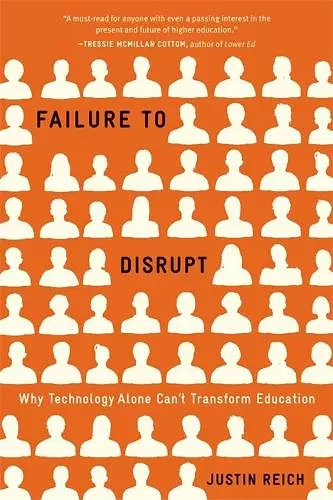Failure to Disrupt
Why Technology Alone Can’t Transform Education
Format:Paperback
Publisher:Harvard University Press
Published:28th Oct '22
Should be back in stock very soon

A Science “Reading List for Uncertain Times” Selection
“A must-read for anyone with even a passing interest in the present and future of higher education.”
—Tressie McMillan Cottom, author of Lower Ed
“A must-read for the education-invested as well as the education-interested.”
—Forbes
Proponents of massive online learning have promised that technology will radically accelerate learning and democratize education. Much-publicized experiments, often underwritten by Silicon Valley entrepreneurs, have been launched at elite universities and elementary schools in the poorest neighborhoods. But a decade after the “year of the MOOC,” the promise of disruption seems premature.
In Failure to Disrupt, Justin Reich takes us on a tour of MOOCs, autograders, “intelligent tutors,” and other edtech platforms and delivers a sobering report card. Institutions and investors favor programs that scale up quickly at the expense of true innovation. Learning technologies—even those that are free—do little to combat the growing inequality in education. Technology is a phenomenal tool in the right hands, but no killer app will shortcut the hard road of institutional change.
“I’m not sure if Reich is as famous outside of learning science and online education circles as he is inside. He should be…Reading and talking about Failure to Disrupt should be a prerequisite for any big institutional learning technology initiatives coming out of COVID-19.”
—Inside Higher Ed
“The desire to educate students well using online tools and platforms is more pressing than ever. But as Justin Reich illustrates…many recent technologies that were expected to radically change schooling have instead been used in ways that perpetuate existing systems and their attendant inequalities.”
—Science
As the pandemic forces so many school systems and learning institutions to move online, the desire to educate students well using online tools and platforms is more pressing than ever. But as Justin Reich illustrates in his new book, Failure to Disrupt, there are no easy solutions or one-size-fits-all tools that can aid in this transition, and many recent technologies that were expected to radically change schooling have instead been used in ways that perpetuate existing systems and their attendant inequalities. -- Kanwal Singh * Science *
In a few dozen pages, Reich lays out the embarrassing cycle of copied ideas, massive hype, enormous wasted funding and the unmet promises of edtech—why so many innovations and companies find only dramatically downsized and incremental uses, leaving education fundamentally not disrupted over and over again…A must-read for the education-invested as well as the education-interested. -- Derek Newton * Forbes *
I'm not sure if Reich is as famous outside of learning science and online education circles as he is inside. He should be…Reading and talking about Failure to Disrupt should be a prerequisite for any big institutional learning technology initiatives coming out of COVID-19. -- Joshua Kim * Inside Higher Ed *
Helps readers understand the systems operating through ed tech over the last 60 years: how venture capital backed technologies fall short of disruption; why people prefer incremental changes in how we learn, rarely transforming pedagogy; that tech—even when it’s free—favors those who already have privilege. -- Ki Sung * KQED *
His account of digital technology, neither utopian nor dystopian, offers ‘a tinkerer’s guide to learning at scale,’ to fit—not disrupt—the complex system of school and university education. * Nature *
Reich is to be congratulated on writing an important corrective to our public fascination with ‘disrupting’ higher education. It is all the more devastating for its even-handedness. There is no cheap online solution to delivering world class higher education that meets our nation’s ideals and needs. Anything proposed to do so runs roughshod over closely held values: rigor, access, equality, and justice. This is a must-read for anyone with even a passing interest in the present and future of higher education. -- Tressie McMillan Cottom, author of Lower Ed: The Troubling Rise of For-Profit Colleges in the New Economy
This magisterial book offers a remarkable account of the different approaches to online learning and what can be expected of them. Comprehensive, wide-ranging, and incisive, this book offers a definitive account of the past, present, and future of technology-assisted learning. If you had to pick one book to learn about all things online learning, this would be the one. -- Jal Mehta, coauthor of In Search of Deeper Learning: The Quest to Remake the American High School
If you have already decided that educational technology is a utopia or a dystopia, there’s no need to read this—or, indeed, any—book. But if you desire a clear, balanced, and insightful evaluation of the range of educational technologies, Justin Reich’s book will inform and delight you. -- Howard Gardner, author of Frames of Mind: The Theory of Multiple Intelligences
Technology in learning carries a high cost economically and culturally. In a game of trade-offs between efficiency and human development, research remains the critical lens to guide decisions. This exceptional book is the best resource currently available to guide readers to understanding the failure of technology in classrooms, what needs to be done to make a real impact, and the critical importance of education as community. -- George Siemens, Executive Director of the Learning Innovation and Networked Knowledge Research Lab, The University of Texas at Arlington
ISBN: 9780674278684
Dimensions: unknown
Weight: unknown
336 pages